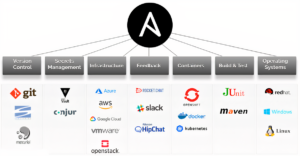Top 15 Benefits Of Ansible

Introduction
Ansible is a widely recognized open-source automation tool designed to streamline IT tasks such as configuration management, application deployment, and orchestration. Developed by Red Hat, it employs a simple, declarative YAML syntax, allowing users to define the desired state of their systems easily. With an agentless architecture, Ansible minimizes the overhead of managing servers while ensuring idempotency to maintain consistent environments. Its extensive ecosystem of modules, strong integration capabilities, and active community support make it a powerful solution for automating complex workflows. This versatility and ease of use have made Ansible a popular choice in the DevOps landscape. Therefore, aspiring professionals must join the Ansible Online Course for the best learning experience.
What Is Ansible?

Ansible is an open-source automation tool that simplifies IT tasks such as configuration management, application deployment, and orchestration. Developed by Red Hat, it uses a declarative language to define automation scripts, known as playbooks, which describe the desired state of a system. Ansible operates on a push-based model, meaning commands are sent from a control node to managed nodes over SSH or WinRM without requiring an agent on the target machines.
One of Ansible’s key features is its idempotency, ensuring that repeated executions of a playbook do not lead to unintended changes. This makes it ideal for maintaining consistent environments. Ansible’s modular architecture allows users to extend its capabilities with custom modules and plugins. Its ease of use, minimal setup requirements, and rich ecosystem make Ansible a popular choice for DevOps practices, enabling teams to automate tasks efficiently and improve productivity.
Ansible Features
Ansible boasts several features that make it a powerful automation tool:
- Agentless Architecture: Ansible operates without requiring agents on managed nodes, simplifying installation and management.
- Declarative Language: Using YAML syntax, Ansible allows users to define desired states, making playbooks easy to read and write.
- Idempotency: Ansible ensures that applying the same playbook multiple times results in the same state, preventing unintended changes and ensuring consistency.
- Extensible Modules: Users can create custom modules and use existing ones to extend Ansible’s functionality across various platforms.
- Inventory Management: Ansible supports dynamic and static inventory files, allowing for easy management of hosts and groups.
- Playbook Reusability: Playbooks can be reused and shared, promoting best practices and reducing redundancy.
- Integration Capabilities: Ansible integrates well with other tools and platforms, enhancing its utility in complex environments.
These features contribute to Ansible’s popularity in DevOps and IT automation. Consider joining the Ansible Online Course to learn more.

Top 15 Benefits Of Ansible
Ansible offers a wide range of benefits that make it a preferred choice for IT automation and DevOps practices.
Here are the top 15 benefits:
- Simplicity: Ansible’s straightforward YAML syntax makes it easy for users to learn and create playbooks, lowering the barrier to entry for automation.
- Agentless: Unlike other automation tools, Ansible does not require agents on target machines, simplifying deployment and reducing resource consumption.
- Idempotency: Ansible ensures that executing playbooks multiple times does not change the system state unnecessarily, promoting reliability and consistency.
- Scalability: Ansible can manage a few servers or thousands of them, making it suitable for both small and large-scale deployments.
- Modular Design: With a rich library of built-in modules, users can extend functionality easily by creating custom modules as needed.
- Cross-Platform Support: Ansible supports various operating systems, cloud providers, and network devices, enabling a unified automation strategy.
- Community and Ecosystem: Ansible has a large and active community that contributes modules, plugins, and documentation, enhancing its capabilities.
- Version Control: Playbooks can be version-controlled, allowing teams to track changes and collaborate more effectively.
- Integration: Ansible seamlessly integrates with other tools like Jenkins, Docker, and Kubernetes, facilitating continuous integration and deployment workflows.
- Declarative Language: Users define the desired state of systems rather than the steps to achieve them, making playbooks easier to understand and maintain.
- Inventory Management: Ansible provides flexible inventory options, allowing users to manage hosts dynamically or statically, catering to various environments.
- Playbook Reusability: Ansible encourages reusability, helping teams to build standardized automation processes and reduce redundancy.
- Task Execution Order: Users can control the order of task execution, ensuring that dependencies are respected and processes run smoothly.
- Security: Ansible can handle sensitive data securely using Ansible Vault, which encrypts passwords and other confidential information.
- Cost-Effective: Being open-source, Ansible can be used without licensing fees, making it a cost-effective solution for organizations looking to automate their IT processes.
These benefits collectively empower organizations to improve operational efficiency, enhance collaboration, and streamline their IT workflows through effective automation. One can join the Ansible Training in Delhi for the best opportunities in this field.
Conclusion
In summary, Ansible is a powerful and versatile automation tool that simplifies IT management through its agentless architecture, user-friendly syntax, and extensive feature set. Its ability to ensure idempotency, scalability, and cross-platform support makes it ideal for organizations of all sizes. With a vibrant community and strong integration capabilities, Ansible enhances operational efficiency, enabling teams to automate tasks effectively and focus on strategic initiatives. Its cost-effective nature further solidifies its position as a leading automation solution.





